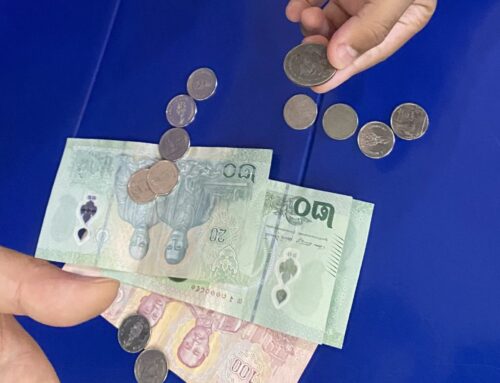By Josh Butterworth. Josh is our Thailand Program Coordinator, and lives in Thailand.
Thailand is known for its warm smiles and relaxed pace of life, but step into a Thai classroom and you’ll quickly realize — school life here comes with its own unique rhythm and rules. While teachers are respected and classrooms are generally calm, there’s a delicate dance of cultural norms, expectations, and unspoken etiquette that newcomers can easily stumble through.
After spending one year teaching in the Land of Smiles, I’ve put together a short guide to help you avoid the common pitfalls, understand what’s expected, and blend in seamlessly with your Thai students and colleagues alike.
DO’S
Show Respect
One of the most important things to understand about Thai schools — and Thai society in general — is the deep respect for the nation, the monarchy, and religion. These three pillars are treated with a seriousness that might feel unfamiliar to newcomers, but showing the proper reverence isn’t just polite — it’s essential.
You’ll see students stand for the national anthem each morning, pay respects to portraits of the King, and regularly take part in Buddhist ceremonies. As a teacher, you’re expected to follow suit. Speaking casually or critically about the royal family is not just frowned upon — it’s a serious offence. The same goes for stepping on money (which bears the King’s image) or being dismissive during religious activities. Even if you’re not religious yourself, showing quiet respect goes a long way — and will earn you a lot of goodwill in and out of the classroom.
These aren’t just formalities — they’re reflections of deep-rooted cultural values. Respect them, and you’ll be warmly welcomed into the school community.
Dress Right
Imagine walking into the staffroom in the morning, feeling confident in your new blue shirt — only to find everyone else decked out in soft pink. It’s not a themed party — it’s just Thailand, where each day of the week has its own lucky colour. And within schools and government workplaces, people really stick to it.
While no one will call you out for clashing with the colour of the day, you’ll feel it. Some schools even assign coloured polos for each day, and they really appreciate it when teachers play along. Monday is yellow, Tuesday is pink, Wednesday is green, Thursday is orange, Friday is blue, Saturday is purple, and Sunday is red.
Pair that with the expectation to dress smartly — tidy collars, skirts, and proper shoes — and you’ll realise that your appearance isn’t just about looking good, it’s a sign of professionalism and respect. Dressing well helps you earn trust, set the tone in the classroom, and show you take the role seriously from day one.
Wai
The wai — that graceful palms-together gesture — is more than just a greeting in Thailand. It’s a daily show of respect, and in schools, it’s everywhere. You’ll see students wai teachers as they walk past, at the start and end of lessons, and even just passing in the hallway. It might feel formal at first, but you’ll get used to it — and you’re expected to return it.
When it comes to other teachers, especially senior staff or the director, always initiate a wai. It’s a small act that goes a long way in showing humility and understanding of Thai customs. Among colleagues, it’s usually accompanied by a friendly smile or nod, but hierarchy matters — don’t skip it when greeting senior management.
Outside of school, waiing is a little more relaxed — and often replaced by a smile or nod. But within school grounds, it’s a daily ritual that reflects the respect-driven culture you’re stepping into. Embrace it early and it’ll become second nature.
DON’TS
Heads and Feet
One of the quickest ways to make students and your colleagues feel uncomfortable in the classroom — even without meaning to — is to touch a student’s head or wave your feet around carelessly. In Thai culture, the head is considered the most sacred part of the body, while the feet are the lowest and dirtiest. That means no friendly head pats, no ruffling hair, and definitely no reaching over someone’s head to grab a pen or shut a window.
Equally, be mindful of where your feet are pointing. Propping them up on a chair, resting them on a desk, or pointing them at people — even accidentally — can come across as deeply disrespectful. Sitting cross-legged on the floor? Tuck your feet behind you or to the side.
It might seem like a small detail, and honestly, no one’s going to throw you out for getting it wrong once or twice. But these habits matter. A little awareness goes a long way — and shows you’re trying.
Complain in Public
We love a good moan in the West — whether it’s about the heat, the traffic, or the Wi-Fi speed. It’s practically a bonding ritual in some cultures. But in Thailand, especially in schools, public complaining is seen very differently. Raising your voice, criticising someone in front of others, or visibly venting frustration can come across as rude, disrespectful, and even embarrassing — not just for you, but for everyone around you.
Thai culture values saving face, harmony, and keeping things light. If something’s wrong, it’s better to bring it up privately, gently, and preferably with a smile. This doesn’t mean you have to bottle everything up or pretend everything’s perfect — just choose your moment and your tone.
Even harmless grumbles can land the wrong way when overheard by students or staff. Keep things upbeat in public, and save the rants for a private moment outside of school. Even group chats can backfire — so when in doubt, stay professional until you’re well out of earshot.
Get Overly Emotional
Staying calm under pressure isn’t just a good teaching habit — in Thai schools, it’s a cultural expectation. Losing your temper, raising your voice, or showing visible frustration can make students shut down and colleagues feel uncomfortable. But it’s not just about anger — even overly expressive reactions, like cheering loudly or getting visibly upset, can feel out of place in Thai schools.
Thai culture values emotional control and composure. Strong emotional outbursts, whether negative or positive, can be seen as a lack of maturity or self-restraint. Western classrooms might embrace passion and high energy, but in Thailand, calmness carries far more weight.
That doesn’t mean you have to be robotic — warmth, humour, and encouragement are all welcome. Just aim to keep your reactions measured. If something goes wrong, stay cool. If something goes brilliantly, smile and carry on. The ability to manage your emotions calmly is one of the clearest ways to gain trust and respect in Thai schools.
Now that you know how to navigate Thai school life, it’s time to put that knowledge to good use and start your journey in the Land of Smiles. And what better way than teaching? You’ll earn a salary, gain real-life classroom experience, and become part of a local community in a way tourists never can.
We’ve got placements waiting for you across the country — from buzzing cities to laid-back rural towns — all part of our Thailand program. Ready to start something new, meaningful, and unforgettable? Join us this October 2025 and take the first step toward your next big adventure. Let’s make it happen!




